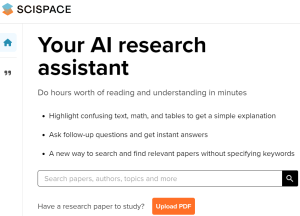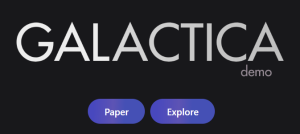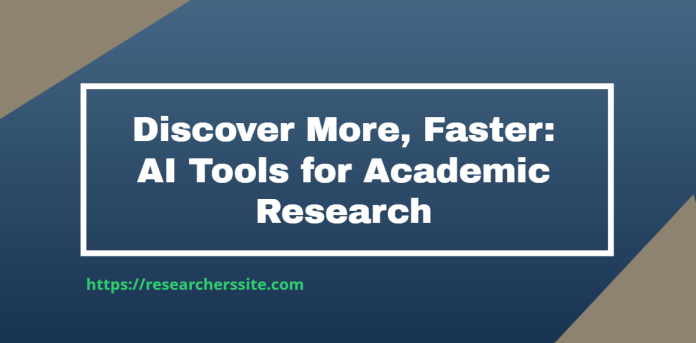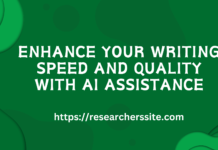In today’s fast-paced academic world, researchers are constantly seeking new ways to optimize their workflow, streamline their research work, and get valuable insights more quickly. That is where AI-powered tools come in.
These AI-assisted digital tools let you help to achieve the goals faster and with greater accuracy than ever before.
In this blog post, we will take a closer look at some of the most innovative AI-based tools available for academic research. We will explore the ways in which AI tools assist researchers discover more, faster.
Whether you are a seasoned academic researcher looking to stay ahead of the curve, or a PhD scholar just starting out in your research journey, this blog post is for you.
We will provide you with valuable insights and information on the latest application for academic research.
So buckle up and get ready to discover more, faster, with the power of Artificial Intelligence software for academic research!
I have previously written a blog post about AI-powered useful tool to find the answers from academic research papers.
Best AI-Powered Tools for Academic Research
AI tools have revolutionized academic research by offering quick and efficient ways to discover relevant content.
With the help of these free AI-based tools, academic research has become more efficient, productive, and impactful.
Below are the handy AI-driven innovative academic research tools:
#1 Elicit
Elicit is an application that assists you in finding the most relevant information from academic journal articles by utilizing Large Language Models (LLM, specifically GPT-3).
Currently, the primary users of the cutting-edge software are individuals who are involved in research activities as of the start of 2022.

To discover the relevant scholarly papers without exact keyword match we use these AI based Research Assistants.
Additionally the AI application can also extract the key information from the scholarly articles.
Moreover, the tool summarizes takeaways from the research manuscript specific to your question.
In order to begin utilizing the useful tool, it is necessary to register for an account on their website. Once you create the account, you can access the application by logging in.
#2 Consensus.app (Evidence-based Answers)
Consensus.app is a search engine that uses AI to extract and distill findings directly from scientific research paper.
This cutting-edge app makes obtaining relevant information from peer-reviewed scholarly paper as easy as a Google search.
It uses the Large Language Models (LLM) to provide the information from scholarly publication.

The Consensus only surfaces the existing text. During the search process, the software uses AI to read the peer-review paper and caters their key findings.
Generally Consensus search produces results based on evidence from peer-reviewed studies.
The AI tool uses the dataset from Semantic Scholar Corpus, CORE and SciScore.
At the time of writing this blog post ( 21st March 2023) they officially launched GPT-4-powered scientific summaries.
The first version of Consensus, allowed for faster, more efficient searching of scientific research.
The main objective of this app is to use Artificial Intelligence application to make science accessible and consumable for all.
#3 Scispace
This innovative tool simplifies the research process and enhance collaboration among researchers, publishers, and institutions.
SciSpace AI Research Assistant is an end-to-end purpose-built workspace that lets you automate repetitive tasks. It discovers relevant information quickly and enhances academic research with AI technology.
The software claims to have an archive consisting of more than 200 million academic articles and 50 million open-access full-text PDF files available which includes detailed information covering various fields of study.

In addition to that the Scispace includes a variety of collaboration features, enabling researchers to work together seamlessly and efficiently.
One of the major benefits of the SciSpace AI software is its ability to streamline the research workflow.
With its advanced search features, Scholars can quickly find the relevant information they need, without having to sift through hundreds of papers.
In order to enhance collaboration, automate mundane tasks, and facilitate swift information discovery for the researchers they designed a workspace.
The same facility has also been extended for both publishers and institutions.
It is worth mentioning that the AI research assistant tool is its focus on Open Access. The Scispace uses the open access Own corpus dataset.
Furthermore, the tool integrates a vast repository of open access articles, making academic research more accessible to everyone regardless of their institutional affiliation.
It is based on large language models (GPT-3 technology) of OpenAI and provides answers from abstract and full text.
Scispace is a generative AI that operates by utilizing existing text but also has the capability to generate new text to provide answers.
As the world of research continues to evolve, the SciSpace AI will undoubtedly play a vital role in shaping the future of research.
SciSpace Copilot is intuitive and interactive that caters you with summaries, explanations, and answers as you read scholarly article.
Copilot is always available and it assists you to find and understand research papers.
#4 Galactica by Meta AI
It is becoming increasingly difficult to discover important information in a huge amount of scientific literature and data due to its exponential growth.
While search engines are used to access scientific knowledge, they are insufficient for organizing it.
At present, scientific knowledge is primarily accessed through search engines, but these platforms are insufficient in organizing scientific knowledge on their own.

In order to alleviate the above-mentioned issues, Galactica plays a pivotal role. The tool can store, combine and reason about scientific knowledge.
Galactica is developed by Meta AI that is designed to enhance scientific research and discovery.
Basically it is a large language model and train on a large scientific corpus of papers, reference material, and knowledge bases.
#5 Scite.ai
Scite.ai is a powerful platform that allows you to analyze the scientific papers and extract meaningful insights from them.
With this handy tool, academic researchers can quickly and easily identify the most relevant research articles in their domain.

Besides, it can track the latest developments and trends, and gain new insights into the latest research.
By analyzing citation data and other factors, Scite.ai can help you detect the papers that have had the greatest impact on their field.
The tool uses a “smart citations” for exploring the context in which a paper is cited. And it also provide you a better understanding of its relevance and significance.
Scite.ai is also designed to be highly user-friendly, with an intuitive interface that makes it easy for researchers to quickly find the information they need.
As per their site, they introduced the capability for researchers to ask research questions in plain language and get answers directly from the full text of research articles
Conclusion
The AI tools are transforming the way researchers conduct academic research. They offer a variety of benefits, from automating tedious tasks to discovering new research directions.
However, it is important for researchers to use these state-of-the-art applications responsibly and ethically to ensure the integrity of their research.
If you are a researcher looking to save time and improve the quality of your work, I encourage you to explore the above-mentioned AI-powered tools available and incorporate them into your research work.
With the right tools and techniques, you can discover more, faster, and take your academic research to new heights.














